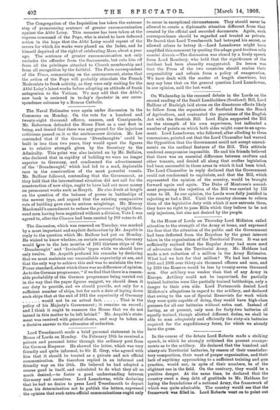Lord Tweedmouth made a brief personal statement in the House
of Lords on Monday. On February 18th he received a private and personal letter through the ordinary post from the German Emperor. He showed the letter, which was very friendly and quite informal, to Sir E. Grey, who agreed with him that it should be treated as a private and not official communication. He therefore replied in an informal and friendly way on the 20th. He believed he had adopted a course good in itself, and calculated to do what they all so much desired,—to foster a good understanding between Germany and ourselves. Lord Lansdowne, while declaring that be had no desire to press Lord Tweedmouth to depart from his determination not to publish the letters, expressed the opinion that such extra-official communications ought only
to occur in exceptional circumstances. They should never be allowed to create a diplomatic situation different from that created by the official and recorded documents. Again, such correspondence should be regarded and treated as private. He feared that Lord Tweedmouth had betrayed his secret, or allowed others to betray it —Lord Lansdowne might have amplified this comment by quoting the adage quod taciturn veils nemini dixeris.—The discussion was closed by a lively speech from Lord Rosebery, who held that the significance of the incident had been absurdly exaggerated. Its lesson was that the Press of the two countries should realise their responsibility and refrain from a policy of exasperation. We have dealt with the matter at length elsewhere, but may say here that on the general question Lord Lansdowne, in our opinion, said the last word.










































 Previous page
Previous page